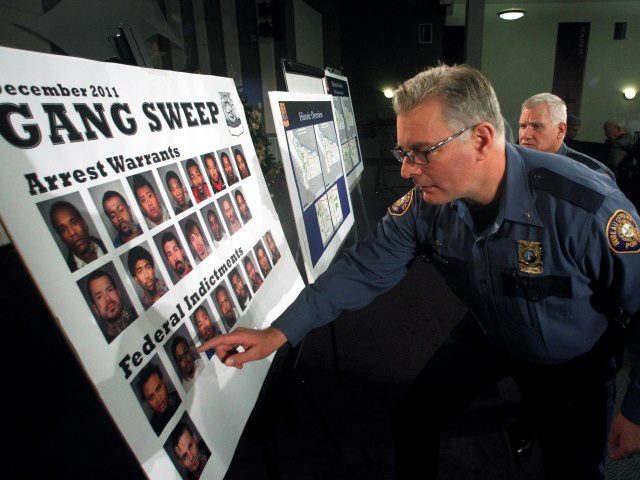In a move that appears to put political correctness above public safety, the police department in Portland, Oregon, will be stopping the practice of identifying gang members in their databases. The department will purge their records in response to strong community concerns about the labels that have disproportionately affected minorities.
During a recent announcement, Acting Tactical Operations Captain Andy Shearer said the Police Bureau recognized that gang designations have led to “unintended consequences.” He stated these labels act as lifelong barriers for those who have shunned the gang lifestyle and tried to get jobs.
The new policy is scheduled to take effect next month. The policy will end their more than 20-year-old practice of documenting and designating gang members. This new policy is viewed by multiple gang experts who spoke with Breitbart Texas, as one that will severely impair investigators and prosecutors by making it more difficult to identify gang crimes.
Gang designations are used by law enforcement to identify gang members because gang crimes tend to be different than regular street crimes. Unlike regular crimes, where the general motive tends to be personal gain, most gang crimes are carried out to promote the dominance of the gang within a neighborhood or to promote the gang members status within the criminal organization. Generally speaking, gang crimes work by instilling fear through the use of intimidation and violence. The gang’s status can also be promoted by cash generating activities such as street level drug dealing and burglary and theft.
The most effective technique to fight criminal street gangs is to investigate them as a whole instead of individually. When investigating a gang individually, law enforcement is placed in a reactive mode responding to crimes after the fact instead of being proactive and using intelligence based targeting of your most problematic and violent gangs. Most major cities use Criminal Syndicate/RICO laws to investigate gangs with long-term or complex investigations. This requires gang documentation from uniform street personnel who come in daily contact with gang members. These contacts allow investigators to connect numerous gang members with multiple crimes.
Once violent gang members are arrested, prosecutors can ask for enhanced sentencing based on the documentation and prior acts of gang related activities and violence. For those gang members that decide to leave the gang life, most gang designation procedures allow the gang member to shed the label after his gang activity has been inactive for an established amount of time.
In Portland, the push to stop the use of gang designations comes from leaders of Black Male Achievement (BMA), a government funded initiative aimed at promoting equal rights. Former Police Assistant Chief Kevin Modica is one of the leaders within the BMA movement who pushed for the end of gang designations.
Breitbart Texas has reached out to multiple police gang experts nationwide who have voiced serious concerns with the new policy stating that not only will it place citizens in danger but also place law enforcement officials at a higher risk as well.
The push for the new policy comes at a time when Portland reported 155 gang related assaults and shootings in 2016.
An example of how gangs are treated in Arizona, the state legislature passed laws under Arizona Revised Statutes (ARS) which defines who is a gang member and what is the definition of a gang.
For example, in Arizona, gang designation and guidelines are established under state law. Under ARS 13-105.8 /9, the definitions are clearly defined.
8. “Criminal street gang” means an ongoing formal or informal association of persons in which members or associates individually or collectively engage in the commission, attempted commission, facilitation or solicitation of any felony act and that has at least one individual who is a criminal street gang member.
9. “Criminal street gang member” means an individual to whom at least two of the following seven criteria that indicate criminal street gang membership apply:
(a) Self-proclamation.
(b) Witness testimony or official statement.
(c) Written or electronic correspondence.
(d) Paraphernalia or photographs.
(e) Tattoos.
(f) Clothing or colors.
(g) Any other indicia of street gang membership.
One of the major complaints being voiced by those who have called for abolishing gang designations in Portland, was that police can label someone a “criminal gang affiliate” without a conviction, without an arrest.
It should be noted that in the gang culture, a prospective gang member does not need to show proof of a conviction or arrest to become a member. There are various ways to join a gang but one the most popular is the ritual of “Being Jumped In” which means to receive a beating from the gang for a designated time to prove loyalty and heart.
The unintended consequence’ of the Portland Police’s new policy is the decriminalization of gang crimes since they would be ignoring any gang nexus to a crime a gang member commits.
Robert Arce is a retired Phoenix Police detective with extensive experience working Mexican organized crime and street gangs. Arce has worked in the Balkans, Iraq, Haiti, and recently completed a three-year assignment in Monterrey, Mexico, working out of the Consulate for the United States Department of State, International Narcotics and Law Enforcement Program, where he was the Regional Program Manager for Northeast Mexico (Coahuila, Tamaulipas, Nuevo Leon, Durango, San Luis Potosi, Zacatecas.)

COMMENTS
Please let us know if you're having issues with commenting.